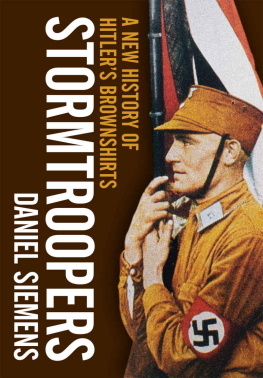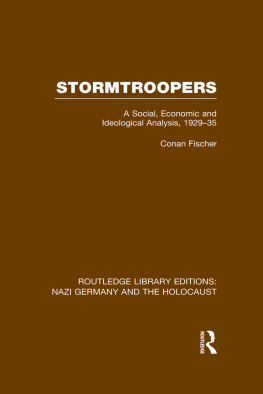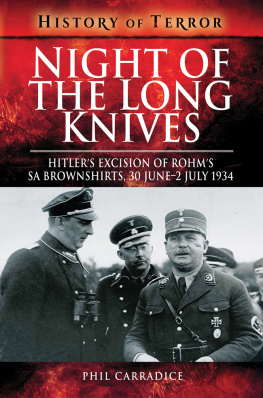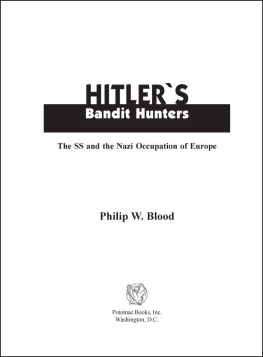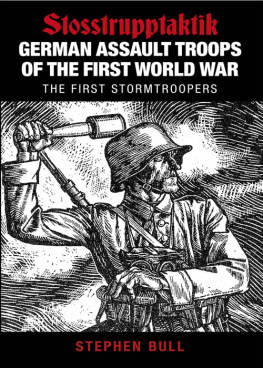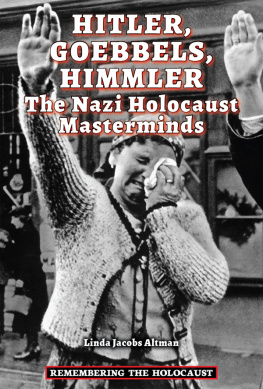STORMTROOPERS

Copyright 2017 Daniel Siemens
All rights reserved. This book may not be reproduced in whole or in part, in any form (beyond that copying permitted by Sections 107 and 108 of the U.S. Copyright Law and except by reviewers for the public press) without written permission from the publishers.
For information about this and other Yale University Press publications, please contact:
U.S. Office:
Europe Office:
Set in Adobe Caslon Pro by IDSUK (DataConnection) Ltd
Printed in Great Britain by TJ International Ltd, Padstow, Cornwall
Library of Congress Control Number: 2017943290
ISBN: 978-0-300-19681-8
A catalogue record for this book is available from the British Library.
10 9 8 7 6 5 4 3 2 1
Dont comfort yourself with the fact that the present age is at fault. That it is in the wrong does not yet mean that we are in the right; its barbarity does not imply that we already behave as human beings, just because we do not agree with it.
Boris Pasternak
It is the experience of violence that unites people.
Wolfgang Sofsky
CONTENTS
PLATES
ACKNOWLEDGEMENTS
A lthough one individual author name appears on the cover of this book, it would never have been completed without the generous help and support from many colleagues, institutions, and friends. Work on this project started with an email I received on 18 April 2012 from Heather McCallum, back then publisher for trade books at Yale University Press. At that time, I was the DAAD Francis L. Carsten Lecturer for Modern German History at University College Londons School of Slavonic and East European Studies (UCL-SSEES). Heather invited me to write a new authoritative history of the SA in the English language, but it initially fell on deaf ears. The Brownshirts? Not again! was my spontaneous reaction. However, after a period of consideration, I warmed to the idea, and soon after found myself immersed in archival documents and old newspapers. Looking for a particular book on the many shelves dedicated to the history of National Socialism became my surrogate sport.
During the past five years, I was fortunate enough to work at two excellent universities, University College London and Bielefeld University, which both provided ideal opportunities for intellectual debate and individual research. I am particularly grateful to Simon Dixon, Axel Krner, Michael Berkowitz, and Andreas Gestrich for their support in London and, later, back in Germany, to the members of my Habilitationskommission Thomas Welskopp, Ingrid Gilcher-Holtey, Michael Wildt, Willibald Steinmetz, and Peter Schuster who, in 2016, read and accepted an earlier version of this book as a habilitation dissertation. Thomas Welskopp, in particular, has been incredibly supportive over the past years, a brilliant historian and a true friend. For the opportunity to discuss aspects of this project at various universities, conferences, and workshops between 2013 and 2016, I am thankful to Arnd Bauerkmper, Frank Bsch, Hubertus Buchstein, Norbert Frei, Ulrike von Hirschhausen, Sylvia Kesper-Biermann, Gabriele Metzler, Markus M. Payk, Kim C. Priemel, Hedwig Richter, Martin Sabrow, Dsire Schauz, Dirk Schumann, Sybille Steinbacher, Nikolaus Wachsmann, Annette Weinke, Richard F. Wetzell, Michael Wildt, and Gerhard Wolf.
University College London, Bielefeld University, the Fritz-Thyssen-Stiftung, the Stiftung Mercator, and the North Rhine-Westphalian Academy of Sciences, Humanities and the Arts generously supported archival research for this project. I am very grateful to fellow historians Sebastian Panwitz and Jenny Fichmann for their expertise, time, and support in organizing rarely looked-at primary sources in Russia and the United States. Hauke Janssen and his team from the documentation department of the Spiegel publishing house in Hamburg provided an excellent working environment for some crucial days at the beginning of this project. At a later stage, a fellowship from Ludwig Maximilian Universitys Center for Advanced Studies, under the managing director Annette Meyer, allowed for detailed research in the archives and libraries of the Munich era.
Some of my ideas in this book have appeared in print elsewhere. Parts of has been accepted for publication in the Journal of Genocide Research in 2017. I am grateful to both journals for their permission to use these texts in modified form for my book.
It is impossible to name all friends, colleagues, and family members of former SA men who shared their knowledge and ideas on the Nazi period or helped in a multitude of ways in the completion of this book. I would like to thank Gleb Albert, Bojan Aleksov, Jrg Baberowski, Rdiger Bergien, Robert Bierschneider, Stephanie Bird, Kirsten Bnker, Christina Brauner, Richard Butterwick-Pawlikowski, Bruce Campbell, Jan Daniluk, Herta Dubler-Gmelin, Stefan Dlling, Siglind Ehinger, Christiane Eisenberg, Ivona Fabris, Juan Luis Fernandez, Andreas Freitger, Geraldine von Frijtag Drabbe Knzel, Mariola Fuerst, Vito Gironda, Michael Graupner, Barbara Hachmann, Wolfgang Hardtwig, Melanie Hartlaub, Elisabeth Harvey, Daniel Hedinger, Susanne Heim, Lara Hensch, Benjamin C. Hett, Tom Hill, Stefan Hrdler, Jochen Hung, Goran Hutinec, Melvyn Ingleby, Henning von Jagow, Mathilde Jamin, Volker Kasche, John Keyne, Egbert Klautke, Jonas Kleinhaus, Niklas Krahwinkel, Alexander Kranz, Christoph Kreutzmller, Anja Kruke, Stefan Laffin, Stephan Lehnstaedt, Malte Ludin, Christoph Luther, Karl Lutze, Stephan Malinowski, Caroline Mezger, Dirk A. Moses, Yves Mller, Snke Neitzel, Eduard Niansk, Armin Nolzen, Rainer Orth, Rudolf Paksa, Winfried Ptzold, Zuzana Pincikova, Jan-Philipp Pomplun, Sven Reichardt, Jana Remy, Thomas Reu, Christiane Rothlnder, Christian Schemmert, Markus Schmalzl, Mike Schmeitzner, Sabine Schroyen, Eckhard Steinmetz, Jens Thiel, Jutta Wiegmann, Tobias Winstel, Andreas Wirsching, Alexandre Zaljonov, and Benjamin Ziemann.
At Yale University Press in London, Heather McCallum, Melissa Bond, and Marika Lysandrou navigated this project with great enthusiasm through the stages of its Buchwerdung. Two anonymous reviewers provided careful and encouraging feedback that helped me shape crucial arguments made in the book. I am likewise extremely grateful to Sarah Vogelsong and Richard Mason, who, at different moments, carefully edited my manuscript and safeguarded its author from the linguistic traps a non-native speaker is prone to walking into. Finally, Marcel Krueger did not shy away from improving my translations of SA songs, despite their horrific lyrics. All remaining faults are, of course, my own.
Last but not least, this book benefited more than anything else from aspects of life that had nothing to do with history. Seeing my children taking their first steps and growing into personalities of their own kept me going, too. Jan, Emilia, and also Magdalena my partner in crime have witnessed the making of this book from close range. Despite my many hours of absence from home, they have remained cheerful and supportive throughout. I owe you more than I can possibly say.
Daniel Siemens
Bielefeld, January 2017
INTRODUCTION
A Night of Violence
Countless images of the saints creep out of the bedrooms darkness; become living caricatures and close in on him: half hostile, half preposterous.
August Scholtis, 1931
I n the East German province of Upper Silesia, 9 August 1932 was a cool summer day, and the following night was unusually fresh. These were to be the last hours of Konrad Pietrzuch,
All three were asleep when a group of men encircled the house in the early hours of 10 August. These men came from the surrounding villages and were members of the local branch of the National Socialist
Next page
